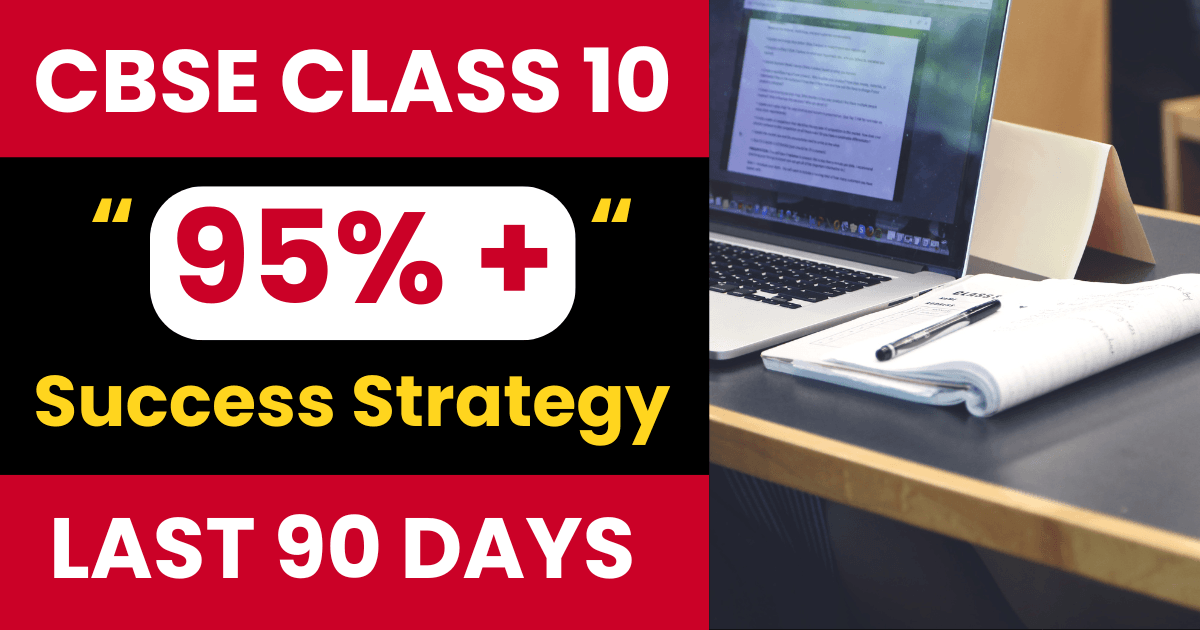Three months. That's all you have before your CBSE Class 10 board exams begin. It might sound scary, but here's the truth: 90 days is more than enough time to score 95% or higher, if you study smart, not just hard.
This isn't about pulling all-nighters or memorizing textbooks word-for-word. This is about working strategically, focusing on what actually matters, and building confidence with every single day. Whether you're starting from scratch or polishing what you already know, this guide will walk you through exactly what to do.
Let's turn these 90 days into your strongest academic performance yet.
Why 90 Days Is Your Sweet Spot
Ninety days gives you enough time to cover everything without rushing, but it's short enough to maintain urgency. You can revise each subject 3–4 times, practice hundreds of questions, and still have breathing room for weak areas.
The students who score 95%+ don't study more hours; they study the right things at the right time. That's what this plan does.
Week 1–4: Build Your Foundation (Days 1–30)
Get Your Study Materials Ready
Before you dive in, gather everything you need:
- NCERT textbooks for all five subjects (Maths, Science, Social Science, English, Hindi)
- Previous 10 years' question papers (2015–2025)
- NCERT Exemplar for Maths and Science
- One reference book per subject (optional, only if NCERT feels insufficient)
Your goal in the first month is simple: complete the NCERT syllabus for all subjects, one chapter at a time.
The NCERT-First Rule
NCERT is your Bible. The CBSE sets 80–90% of questions directly from NCERT or based on NCERT concepts. Every line, every example, every exercise matters.
How to study each chapter:
- Read actively – Don't just read. Underline key terms, write margin notes, and ask yourself questions.
- Solve all NCERT exercises – Every single question. No shortcuts. These questions repeat on boards.
- Make short notes – Write down formulas, definitions, important dates, and diagrams on separate sheets. You'll thank yourself during revision.
Spend 6–7 hours daily in this phase. Divide your time like this:
- Maths: 2 hours
- Science: 2 hours
- Social Science: 1.5 hours
- Languages: 1.5 hours
Subject-Specific Tips for Month 1
Mathematics: Focus on understanding, not memorizing. Practice every theorem proof. Solve at least 20 questions per chapter: mix easy, medium, and tough ones.
Science: Draw diagrams as you study. Label them clearly. For Physics and Chemistry, understand derivations. For Biology, make flowcharts for processes like photosynthesis or the human digestive system.
Social Science: Create timelines for History, maps for Geography, and one-line summaries for Political Science and Economics chapters. This subject is scoring if you're organized.
English: Read the Literature chapters twice. Understand themes, character sketches, and important quotes. For Writing, practice one letter, one article, every week.
Week 5–8: Practice and Problem-Solving (Days 31–60)
By now, you've finished the syllabus. This month is about applying what you've learned.
Start Solving Previous Years' Papers
Download CBSE question papers from 2015 to 2025. Solve them subject-wise first, not like full exams yet.
Why this works: You'll see patterns. Certain questions repeat. Certain topics are favorites (like quadratic equations in Maths or "sustainable development" in Social Science). You'll know exactly where to focus.
After solving, check your answers. For every mistake, go back to the NCERT and revise that concept.
Focus on Weak Areas
Make a "Weak Topics" list. Maybe you struggle with Algebra, or you keep forgetting dates in History. Dedicate 30–45 minutes daily to these topics. Use YouTube for explanations if needed, where you will get the complete breakdown of tough topics easily.
Revise What You've Studied
This is critical. Your brain forgets 70% of what you learn within 24 hours unless you revise. Use your short notes from Month 1 and revise each subject weekly.
Revision schedule:
- Monday: Maths + Science (Physics)
- Tuesday: Science (Chemistry + Biology) + English
- Wednesday: Social Science (History + Civics)
- Thursday: Social Science (Geography + Economics) + Hindi
- Friday: Maths + weak topics
- Saturday: Full subject revision (alternate subjects)
- Sunday: Practice tests or rest
Week 9–12: Master Exam Strategy (Days 61–90)
The final month is where you sharpen your edge. You've studied. You've practiced. Now you simulate the real exam.
Take Full-Length Mock Tests
Every 3–4 days, sit for a full 3-hour mock exam. Use actual CBSE sample papers or previous years' papers you haven't solved yet. Time yourself strictly.
Why mocks matter: They teach you time management, reveal silly mistakes, and build exam stamina. After each mock, analyze:
- Which questions took too long?
- Where did you lose marks?
- What needs urgent revision?
Perfect Your Answer-Writing
Marks aren't just for knowing, they're for presenting. Follow these rules:
- Write in points wherever possible (especially in Social Science)
- Underline key terms (dates, names, formulas)
- Draw neat diagrams with labels and a pencil
- Show all steps in Maths (even if you know the answer)
- Write clean, legible answers because presentation matters
Practice writing 3-mark, 5-mark, and long-answer questions daily. Keep your handwriting neat and fast.
The Final Fortnight: Rapid Revision
In the last 15 days, stop learning new things. Only revise:
- Your short notes (formulas, definitions, dates)
- NCERT exercises you marked as difficult
- Important diagrams and maps
- Sample papers' toughest questions
Revise one full subject every day. By exam day, you should have revised everything at least 4 times.
The Everyday Habits That Make a Difference
Sleep 7–8 Hours
Your brain consolidates memory during sleep. Skipping sleep = forgetting what you studied.
Stay Off Social Media
Delete Instagram, uninstall games, and keep your phone in another room while studying. Use apps like Forest or Freedom if you need help staying focused.
Eat Well and Exercise
A 20-minute walk or quick workout boosts focus. Eat protein-rich meals, and stay hydrated. Your brain is an organ; it needs fuel.
Study With Breaks
Use the Pomodoro technique: Study for 25 minutes, take a 5-minute break. After four cycles, take a 20-minute break. This prevents burnout.
Your Day-by-Day Study Schedule
Here’s a practical sample routine you can follow during your 90-day preparation period. It balances study, rest, and revision, ensuring consistent progress without burnout.
| Time | Task / Focus Area | Purpose |
| 6:00 – 8:00 AM | Mathematics or your toughest subject | Best time for high-focus subjects; your brain is most alert in the morning. |
| 8:00 – 9:00 AM | Breakfast + short revision | Light review of what you studied the previous day. |
| 9:00 – 11:00 AM | Science | Study conceptual topics (Physics, Chemistry, Biology) while your energy is still high. |
| 11:00 – 11:15 AM | Break | Short refreshment break to reset focus. |
| 11:15 AM – 1:00 PM | Social Science | Cover History, Geography, Civics, or Economics chapters. |
| 1:00 – 2:00 PM | Lunch + rest | Take a proper break to recharge. |
| 2:00 – 4:00 PM | English and Hindi | Focus on the literature, grammar, and writing sections. |
| 4:00 – 4:15 PM | Snack break | Short break before evening study. |
| 4:15 – 6:00 PM | Practice questions or mock tests | Apply what you’ve learned; simulate exam conditions regularly. |
| 6:00 – 7:00 PM | Revision or weak topics | Review formulas, key terms, or chapters that need more attention. |
| 7:00 PM onwards | Dinner, family time, and relaxation | Disconnect from study to maintain a healthy balance and reduce stress. |
Your 95% Checklist to Score 95% in CBSE Class 10 Boards 2026
Before exam day, make sure you've:
- Finished NCERT thoroughly (all exercises, examples, in-text questions)
- Solved 10 years of previous papers
- Revised each subject at least 4 times
- Taken 10+ full-length mocks
- Practiced answer-writing and improved presentation
- Identified and conquered weak topics
Final Words
Ninety days is tight, but it's doable. Thousands of students score 95%+ every year, not because they're geniuses, but because they're disciplined and strategic.
You don't need expensive coaching or fancy notes. You need NCERT, past papers, a solid plan, and the determination to stick to it. Show up every single day, even when it's hard. Your future self will thank you.
The clock is ticking. Day 1 starts now. Go make it count.







